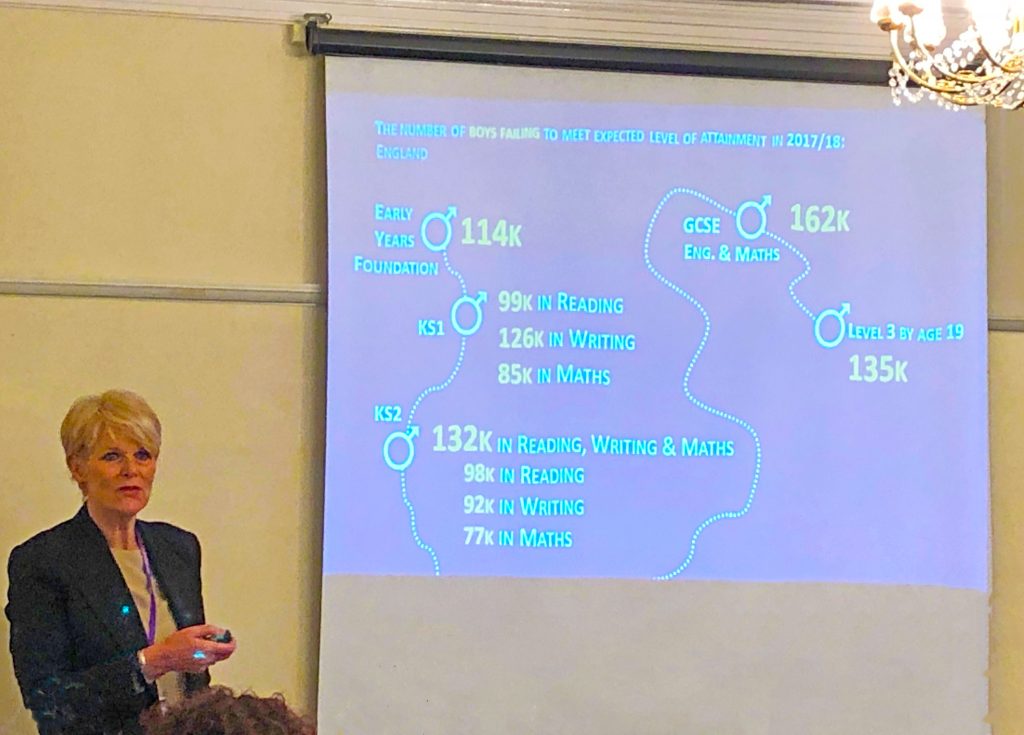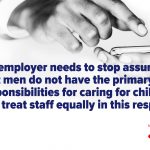I can’t pretend otherwise, it took me a long time to come around to the idea of both International Women’s Day and International Men’s Day. I found them to be slightly vague concepts and at times the debates they have created have been off-putting.

When these occasions approached, I have generally been very wary of going near social media or my email inbox. I didn’t feel any different this year.
International Men’s Day was on Monday and I was concerned about how it would be represented. Would I, for instance, receive an email from the Radical Brotherhood for the Removal of All Female Joy, informing me of its plans to storm Mumsnet’s head office?
Okay, no, no such organisation exists but you get the point. Both IMD and IWD attract a certain amount of unwarranted and unhelpful attention. This year, however, I felt IMD was a very different occasion. Ultimately I think there were three reasons why.
Creating Positive Futures for Boys and Young Men conference
I spent the morning at the Creating Positive Futures for Boys and Young Men conference organised by the Men and Boys Coalition. The conference was looking at the issues faced by boys and young men in the education system.
You could be forgiven for thinking “what problems?” It is, after all, well documented that there are huge issues encouraging girls to study what are widely known as the STEM subjects (science, technology, engineering and mathematics). It goes without saying this is a high profile issue that needs to be dealt with.
That said, I had read newspaper reports about girls doing better than boys in GCSEs, A-levels and at university. What I hadn’t appreciated was how poorly boys are doing. Former UCAS chief executive Mary Curnock Cook, gave a presentation that left me stunned.
Did you know that a girl born today is 75% more likely to go to university than a boy? That 29,000 more girls than boys achieved two A-levels in the 2017/18 academic year? Were you aware that in the the same academic year, 135,000 failed to meet their expected level of attainment by the age of 19 compared to 29,000 girls?
I simply can’t do justice to Curnock Cook’s presentation or the brilliant Creating Positive Futures conference in this blog post. I will write about both in more detail in the days to come. Suffice it to say I left the event feeling very concerned. Such a gender imbalance, which another speaker, Prof Gijsbert Stoet, made clear is a common pattern across the developed world, should not be left unchecked.
I see this imbalance potentially impacting on both boys and girls in the years to come. It was great, however, to see that it was that is was being acknowledged and addressed and IMD was the catalyst. Oh, yes, there is a punchline too. Where do you suppose this conference took place? Mary Sumner House, the London headquarters of the Mother’s Union.
Fatherhood Forfeit discussed at APPG on Fatherhood
This was not the only event taking place on IMD. The All Party Parliamentary Group on Fatherhood met at Portcullis House, opposite the Palace of Westminster. Since the last general election, the make up of the APPG has changed and it;s now co-chaired by both Labour MP David Lammy, who used to do the job single highhandedly, plus Conservative MP Steve Double. One presentation during the event really caught my attention.
Jasmine Kelland, a researcher from Plymouth University, spoke about a project she has worked on looking at fathers who, like me, are the main carers for their children. Kelland has coined the phrase the Fatherhood Forfeit to describe the challenges guys like me face. It relates to discrimination from employers and sexist attitudes from other parents and service providers.
Kelland’s research discovered that employers perceive part time working dads to be the least reliable in the work force, although it doesn’t seem to be based on any evidence. Kelland also discovered some human resources professionals refer to dads who ask to work part time as Tuesdays, Wednesdays And Thursdays.
Read those last four words back and you’ll see it makes an acronym. While written off as harmless office banter, such an approach hardly encourages men to look positively on flexible working and consider it as an option.
Equality and Human Rights Commission video promoting flexible working
This brings on to something else that took place on IMD 2018. The Equality and Human Rights Commission (EHRC) published a video encouraging men to explore the possibility of working flexibly.
I was one of the dads to feature in the two-minute long video. I won’t go over old ground, I published a blog post about this earlier in the week so please do follow this link and read about it at leisure. Just be warned the video has reduced some viewers to tears because of the high levels of cuteness, so make sure you have tissues at hand.
I feel it’s a little sad the EHRC feels it has to go to these lengths. Kelland’s research, however, shows it is necessary and I hope more men do make clear to employers they wish to work flexibly and the days of being called a Tuesday, Wednesday And Thursday are consigned to history.
A positive feeling?
I can’t help feeling this year’s IMD was just a bit different to previous years. Up for discussion on the day were issues affecting boy’s education, how men can be better fathers and how men can change their working patterns to get better work / life balance.
In truth, women have been talking about how these issues affect them for years. It’s good to see men are now discussing them and trying to find solutions, solutions that will benefit both genders. I also think it’s fantastic to see women such as Kelland and Curnock Cook are part of these discussions.
I simply couldn’t help feeling there was a lot to be positive about this year. Next year I won’t approach my email in box or social media channels with quite the same levels of trepidation.
Interested in this blog post? Well have a read of these...
 At last: Recognition that dads are trying to ‘have it all’
At last: Recognition that dads are trying to ‘have it all’ Meet the dads who left employment to improve their work life balance
Meet the dads who left employment to improve their work life balance Equal Lives: Men, women, caring responsibilities and the workplace
Equal Lives: Men, women, caring responsibilities and the workplace Improved paternity pay and other workplace changes. An opportunity missed.
Improved paternity pay and other workplace changes. An opportunity missed. An unlikely route to better work/ life balance: Artificial foliage
An unlikely route to better work/ life balance: Artificial foliage


2 thoughts on “International Men’s Day 2018: A positive experience?”
Pingback: Media Coverage of International Men’s Day 2018 | IMD UK
Pingback: Media Coverage of International Men's Day 2018 | UK Men's Day